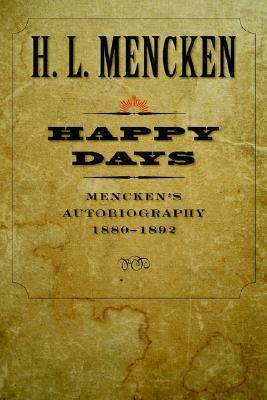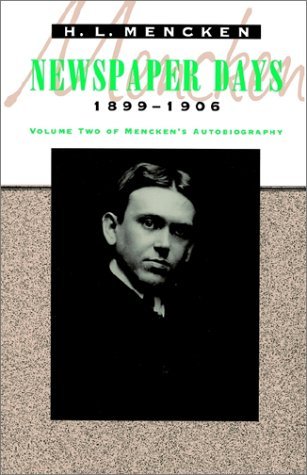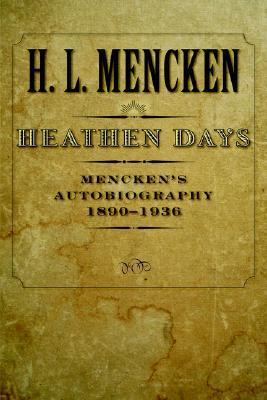


Books in series

#1
Happy Days
1940
With a style that combined biting sarcasm with the "language of the free lunch counter," Henry Louis Mencken shook politics and politicians for nearly half a century. Now, fifty years after Mencken’s death, the Johns Hopkins University Press announces The Buncombe Collection, newly packaged editions of nine Mencken Happy Days, Heathen Days, Newspaper Day s, Prejudices, Treatise on the Gods, On Politics, Thirty-Five Years of Newspaper Work, Minority Report, and A Second Mencken Chrestomathy . With a style that combined biting sarcasm with the "language of the free lunch counter," Henry Louis Mencken shook politics and politicians for nearly half a century. Now, fifty years after Mencken’s death, the Johns Hopkins University Press announces The Buncombe Collection, newly packaged editions of nine Mencken Happy Days, Heathen Days, Newspaper Day s, Prejudices, Treatise on the Gods, On Politics, Thirty-Five Years of Newspaper Work, Minority Report, and A Second Mencken Chrestomathy . Most of these autobiographical writings first appeared in the New Yorker . Here Mencken recalls memories of a safe and happy boyhood in the Baltimore of the 1880s.

#2
Newspaper Days, 1899-1906
1941
In the second volume of his autobiography, Mencken recalls his early years as a reporter. On January 16, 1899, H.L. Mencken applied for a job with the Baltimore Morning Herald, much to the editor's amusement. But Mencken persisted, and came back to the offices night after night until finally, in February, the editor sent him out into a blizzard to see if anything worth printing was happening on the snow-covered streets. Soon, Mencken was assigned to the police beat, and then to city hall, where the really big crooks worked.Mencken learned his craft so well that by 1901 he became the Herald 's Sunday editor, and by 1906 was hired as an editor of the Baltimore Sun, where he quickly attracted a national following. Sustained by a steady diet of crabs, cigars, whiskey, and beer, he haunted Baltimore's jails and courtrooms, its churches, theaters, and saloons, and chased fire wagons, interviewed cops and coroners, battled politicians and crusaders, and raced back to the newsroom to beat his deadline by a second or two.

#3
Heathen Days
1941
With a style that combined biting sarcasm with the "language of the free lunch counter," Henry Louis Mencken shook politics and politicians for nearly half a century. Now, fifty years after Mencken’s death, the Johns Hopkins University Press announces The Buncombe Collection, newly packaged editions of nine Mencken Happy Days, Heathen Days, Newspaper Day s, Prejudices, Treatise on the Gods, On Politics, Thirty-Five Years of Newspaper Work, Minority Report, and A Second Mencken Chrestomathy . With a style that combined biting sarcasm with the "language of the free lunch counter," Henry Louis Mencken shook politics and politicians for nearly half a century. Now, fifty years after Mencken’s death, the Johns Hopkins University Press announces The Buncombe Collection, newly packaged editions of nine Mencken Happy Days, Heathen Days, Newspaper Day s, Prejudices, Treatise on the Gods, On Politics, Thirty-Five Years of Newspaper Work, Minority Report, and A Second Mencken Chrestomathy . In the third volume of his autobiography, H. L. Mencken covers a range of subjects, from Hoggie Unglebower, the best dog trainer in Christendom, to his visit to the Holy Land, where he looked for the ruins of Gomorrah.